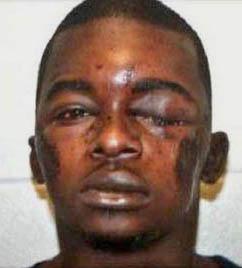 A young Black man has been brutally beaten by the police – and not only have his attackers gone unpunished, but their victim has been sent to jail instead.
A young Black man has been brutally beaten by the police – and not only have his attackers gone unpunished, but their victim has been sent to jail instead.
On the evening of March 5, Joshua Robinson was stopped by police, allegedly for a traffic violation, while driving home from his girlfriend’s house on Providence’s South Side. By the police department’s own account, officers began beating the 21-year-old Joshua while he was still behind the wheel of his car, first striking him in the forehead with a flashlight, then choking him, dragging him out and throwing him to the ground, punching him repeatedly in the face, kneeing him in the ribs, and pepper-spraying him.
In mug shot photos which have circulated on social media, the extent of the police abuse is painfully apparent: Joshua’s left eye is swollen shut, dark bruises spread over both cheeks, and lacerations run above his eyes and across his forehead. And yet it was Joshua who was arrested that night, charged with – and later in district court, convicted of – assault and resisting arrest.
Continuing a pattern now familiar to victims of police violence across the country, Providence police have attempted to justify their brutality by blaming the victim, smearing his reputation, and invoking that ultimate pretext for police terror, the war on drugs. According to Sgt. David Allen, the arresting officer that night and the first of Joshua’s assailants, all of the violence inflicted by the police was necessary to subdue a wild criminal who was fighting off three police officers at once while simultaneously attempting to swallow multiple plastic bags of crack cocaine.
Allen’s version of events is so at odds with reality that it would be comical in any other context. Joshua Robinson stands five feet tall and weighs 115 pounds; the police who brutally assaulted him each stand a full foot taller and weigh nearly twice as much. When pressed by defense counsel on why three grown police officers would need to take so long – and deliver such a beating – to arrest one slightly-built young man, Allen theorized that Joshua had ingested drugs which had given him “superhuman strength.” When asked to describe what injuries the police sustained during their “fight” with Joshua, Allen described some scrapes on the knee he used to strike Joshua in the chest; another officer points to an ankle he mildly twisted while punching Joshua as he lay on the ground.
No evidence of drugs was found at the scene – nothing in Joshua’s car, nothing on his person, and nothing in his system at the hospital to which he was taken – and tellingly, he wasn’t charged with a drug-related crime. Instead, according to the Kafkaesque logic of the criminal justice system, Joshua Robinson was arrested for resisting arrest, and charged with assault after being assaulted. It’s more than apparent at this point, however, that the real offense Joshua committed was the crime of being a young Black man in a viciously racist system.
Just this January, Providence police raided the home of a Cambodian family on the city’s West End, holding a 77 year-old woman at gunpoint and throwing her thirteen year-old grandson to the floor of his room and stomping on him. In 2009, local police were caught on video punching and kicking Luis Mendonca as he lay handcuffed on the ground; like Joshua Robinson, Mendonca was charged with assault after being assaulted. In 2000, white police officers shot and killed Cornel Young, Jr., a Black off-duty cop, after he responded to a disturbance. While Young’s killers on the police force have never been brought to justice, a Latino man at the scene, Aldrin Diaz, was held responsible and charged and convicted of the crime.
These stories outrage not because they are anomalous but because they’ve become so commonplace. In a country in which a Black man is killed by police every thirty-six hours, and in which one in three Black men will be incarcerated in their lifetimes, Joshua Robinson’s case is one particularly egregious example of a much larger system of racist oppression. The violence of the police assault on Joshua has been followed by the violence of his unjust conviction and incarceration, alongside that of countless other men and women of color within the American system of mass incarceration – a system as real, and as brutal, as a cop’s clenched fist.
For now, Joshua Robinson is behind bars, having committed no crime. The real criminals remain at large: the thugs in blue, and the criminal system they represent.
